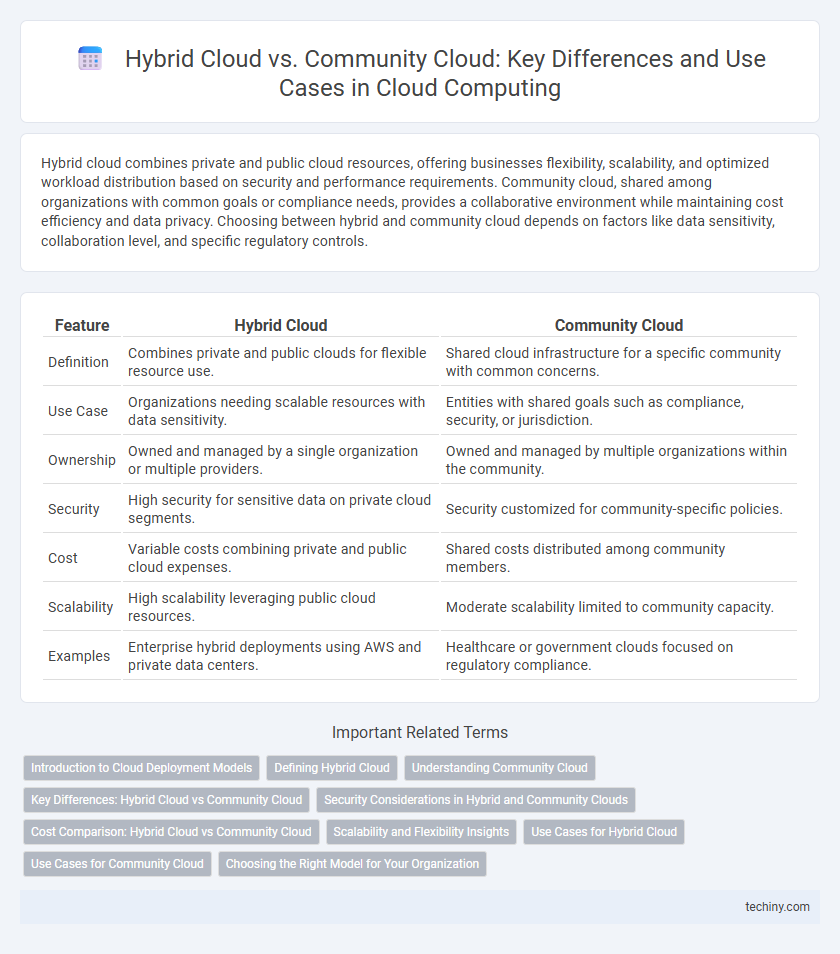Hybrid cloud combines private and public cloud resources, offering businesses flexibility, scalability, and optimized workload distribution based on security and performance requirements. Community cloud, shared among organizations with common goals or compliance needs, provides a collaborative environment while maintaining cost efficiency and data privacy. Choosing between hybrid and community cloud depends on factors like data sensitivity, collaboration level, and specific regulatory controls.
Table of Comparison
| Feature | Hybrid Cloud | Community Cloud |
|---|---|---|
| Definition | Combines private and public clouds for flexible resource use. | Shared cloud infrastructure for a specific community with common concerns. |
| Use Case | Organizations needing scalable resources with data sensitivity. | Entities with shared goals such as compliance, security, or jurisdiction. |
| Ownership | Owned and managed by a single organization or multiple providers. | Owned and managed by multiple organizations within the community. |
| Security | High security for sensitive data on private cloud segments. | Security customized for community-specific policies. |
| Cost | Variable costs combining private and public cloud expenses. | Shared costs distributed among community members. |
| Scalability | High scalability leveraging public cloud resources. | Moderate scalability limited to community capacity. |
| Examples | Enterprise hybrid deployments using AWS and private data centers. | Healthcare or government clouds focused on regulatory compliance. |
Introduction to Cloud Deployment Models
Hybrid cloud combines private and public cloud infrastructures, enabling organizations to balance scalability and control by integrating on-premises resources with third-party services. Community cloud is a collaborative environment shared among multiple organizations with common concerns, such as security, compliance, or jurisdiction, facilitating cost-effective resource pooling and standardized governance. Both deployment models address specific business needs by offering tailored solutions for workload distribution, data management, and regulatory compliance in cloud computing.
Defining Hybrid Cloud
Hybrid cloud integrates private and public cloud environments, enabling seamless data and application portability for enhanced flexibility and scalability. It combines on-premises infrastructure with third-party cloud services, allowing organizations to optimize workloads based on security, compliance, and cost requirements. Hybrid cloud architecture supports dynamic resource allocation, disaster recovery, and efficient management of hybrid workloads across diverse environments.
Understanding Community Cloud
Community Cloud provides a shared infrastructure tailored for organizations with common goals, compliance requirements, or security concerns, enabling collaboration while maintaining data sovereignty. Unlike Hybrid Cloud, which integrates private and public clouds for flexible workload distribution, Community Cloud emphasizes collective resource management among a specific group. This model enhances cost efficiency and regulatory compliance by pooling resources within a defined community.
Key Differences: Hybrid Cloud vs Community Cloud
Hybrid cloud integrates private and public cloud infrastructures, enabling data and application portability for enhanced flexibility and scalability. Community cloud serves a specific group of organizations with shared concerns, offering customized security and compliance tailored to collective needs. Hybrid cloud excels in dynamic workload management, whereas community cloud prioritizes collaboration and regulatory adherence within a defined user group.
Security Considerations in Hybrid and Community Clouds
Hybrid cloud environments combine private and public cloud infrastructures, offering enhanced security through customizable encryption protocols and segmented access controls tailored to specific workloads. Community clouds provide a shared infrastructure among organizations with aligned security requirements, enabling collaborative compliance with industry-specific regulations and unified threat management. Both models necessitate robust identity management and continuous monitoring to address potential vulnerabilities stemming from diverse access points and shared resources.
Cost Comparison: Hybrid Cloud vs Community Cloud
Hybrid cloud typically incurs higher costs due to the integration of both private and public cloud infrastructures, requiring advanced management tools and increased security measures. Community cloud offers cost savings by sharing resources and infrastructure among organizations with similar compliance requirements, reducing individual expenses. Evaluating workload demands and compliance needs helps determine which model provides the most cost-effective solution for specific cloud computing environments.
Scalability and Flexibility Insights
Hybrid cloud environments offer superior scalability by enabling seamless resource allocation between private and public clouds, allowing businesses to dynamically adjust workloads based on demand. Community clouds provide tailored flexibility through shared infrastructure among organizations with similar goals or compliance requirements, but scalability is often limited by the collective resource pool. Opting for hybrid cloud solutions maximizes both scalability and flexibility, accommodating fluctuating workloads while maintaining governance and security standards.
Use Cases for Hybrid Cloud
Hybrid cloud combines public and private cloud resources, offering unparalleled flexibility for businesses needing scalable infrastructure with data sensitivity requirements. Use cases include disaster recovery solutions, where critical data is safeguarded on private clouds while leveraging public cloud resources for backup and rapid recovery. Enterprises with fluctuating workloads benefit from hybrid environments by optimizing cost and performance through dynamic resource allocation.
Use Cases for Community Cloud
Community cloud environments are specifically designed for organizations with shared goals, such as government agencies, healthcare providers, or financial institutions that require collaboration and compliance within a common regulatory framework. Use cases include joint research projects, data sharing among trusted partners, and compliance-driven workloads where security and privacy are paramount. This model enables resource pooling and cost-effective infrastructure while maintaining control over sensitive data within the community.
Choosing the Right Model for Your Organization
Hybrid Cloud offers a flexible infrastructure combining private and public clouds, ideal for organizations requiring scalability and data security simultaneously. Community Cloud provides a shared environment tailored for organizations with common goals or compliance needs, ensuring cost efficiency and collaboration. Selecting the right model depends on factors like data sensitivity, regulatory requirements, and workload variability to optimize performance and cost-effectiveness.
Hybrid Cloud vs Community Cloud Infographic

 techiny.com
techiny.com